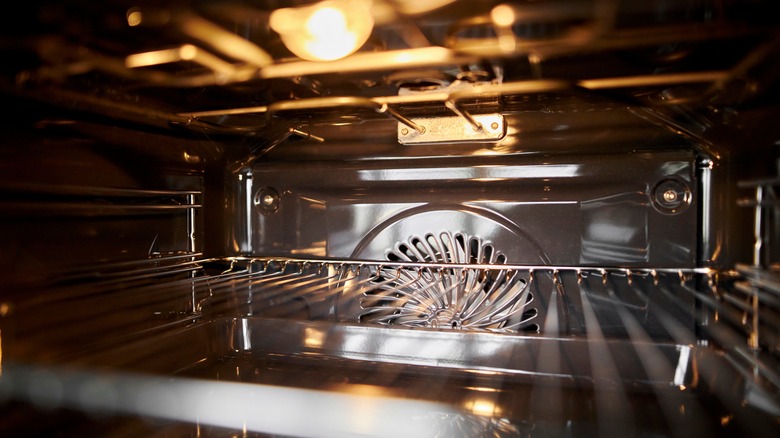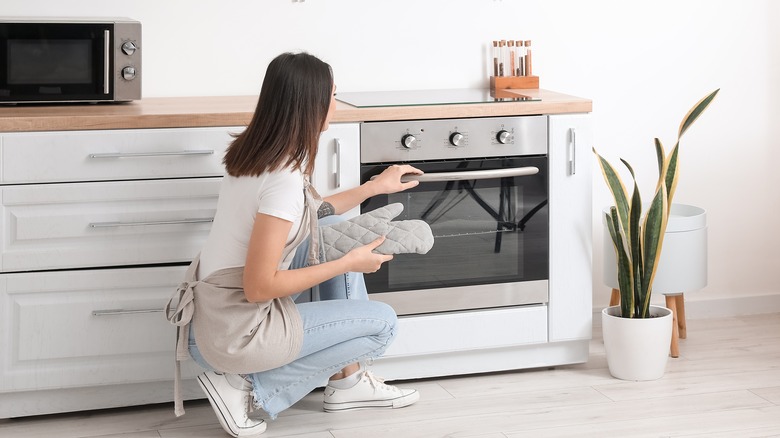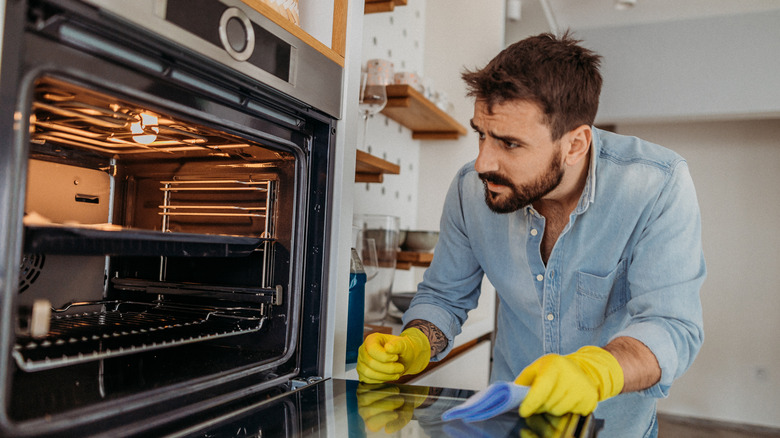The Best And Worst Times To Use An Oven's Self Clean Function
Whether it's used to heat up toast or roast an entire chicken, the oven is a cornerstone of any kitchen. In order for the oven to work as efficiently and safely as possible, it's important to keep it in shape with regular cleanings. Otherwise, it may take ages for your food to cook, and baked-on debris may even catch fire. Cleaning the oven can be a laborious task, and ideally should be done after every use, or at least every few months. Thankfully for those of us who don't have the time or energy for that routine, some modern ovens come equipped with a self-clean function. Just be aware that self-cleaning ovens still require careful attention. If you start an oven's self-clean function at the wrong time, it can be more trouble than cleaning the appliance yourself.
Before figuring out the ideal time to run a self-clean cycle, it helps to understand exactly what's going to be happening inside the oven. Self-cleaning ovens don't use any chemicals or mysterious processes to get the job done. Instead, they heat up to extremely high temperatures — usually around 850 degrees Fahrenheit — in order to burn away stuck food. Afterward, you should be able to easily clean the remnants with a damp cloth. It can take four hours for the process to finish, so you should only run a self-clean cycle when you're home to monitor it for the entire time.
Run self clean cycles when you're in the house
Self-cleaning ovens are designed to be used safely, but no appliance should be left unattended while it's running, especially one that reaches temperatures that surpass those of the planet Mercury. You should plan to utilize the self-clean feature on a day when you don't have any other plans besides maybe some chores around the house. If you time it right, you could clean the whole house while the oven cleans itself for a very industrious Sunday afternoon. Before you start a self-clean cycle, remove everything from the oven including the racks and any rogue baking sheets (you may also want to clean the baking sheets while you're at it). Use a rag to remove any loose ash or grime from the oven and oven door before starting the cycle according to the manufacturer's instructions.
Since the oven will be generating a lot of heat for a long time, the best time of the year to run a cycle is anytime you can comfortably have your windows open to create some ventilation. You may even want to run the kitchen fan or range hood in case there are fumes from any missed burnt crumbs.
Don't self clean last minute
On the other hand, you shouldn't run a self-clean cycle anytime you can't quickly act in case of an emergency. Starting a self-clean right before you go to bed, for instance, is a terrible idea. It will make the house super hot, and you may sleep through any malfunctions that cause safety hazards. You should also avoid using the self-clean feature after using chemicals on the appliance, as they will react poorly with the heat.
The New York Times Wirecutter notes that self-cleaning ovens are imperfect machines, and if your oven is old or poorly maintained, starting a cycle may cause it to break down since it rarely reaches that level of heat on the day-to-day. To avoid catastrophe, Wirecutter recommends not running a self-clean cycle less than six weeks before you're due for a big cooking event like Thanksgiving. Self-cleaning ovens are definitely a boon, but like with any helpful piece of machinery, misuse can end in disaster. Take care of your oven, wipe it down between cooking trays of bacon, and use the self-clean feature every once in a while when you have time to dedicate to a deep clean.


